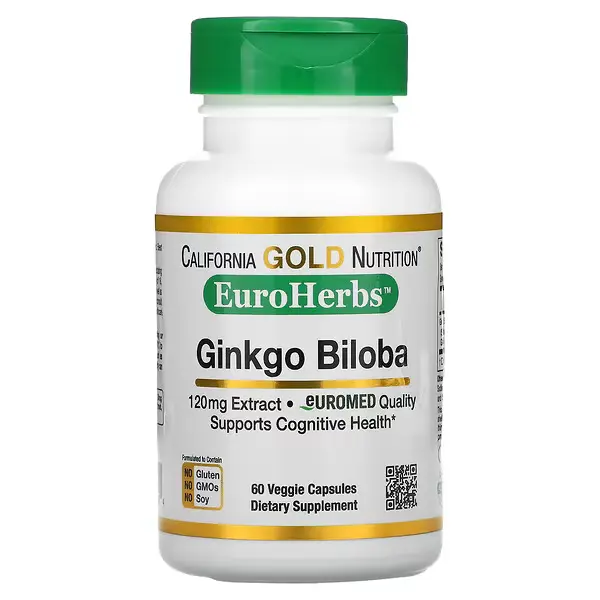Ginkgo Biloba
What is Ginkgo Biloba?
The name Ginkgo Biloba is commonly used to describe the seeds, leaves and nuts belonging to the tree of the same name when used in foods or traditional medicine. The name allegedly comes from the Japanese words for silver apricot; gin kyou.[1] The tree is known for the supposed health benefits of its leaf extract and because it is one of the oldest tree species in the world. These trees which are also known as the maidenhair tree have remained largely unchanged for at least 170 million years.[2] Ginkgo nuts are also used in Chinese cuisine. The leaf extract has been used to treat a host of ailments ranging from high blood pressure[3] to altitude sickness[4] to dementia.[5]
Where does Ginkgo Biloba come from?
Ginkgo Biloba trees used to grow on all continents but are now predominantly found in parts of asia. Because of its use in traditional medicine and the accompanying role in Buddhism and Confucianism, Ginkgo has been cultivated throughout parts of Asia like China, Japan and Korea. In the last few hundred years Ginkgo trees have also been planted in Europe and the Americas. To use Ginkgo as a supplement the leaves can be ground into a powder which may then be put into a solvent. Nuts are roasted and may be unsafe to consume raw.
What are the effects of Ginkgo Biloba?
As is often the case in traditional medicine, Ginkgo Biloba has been used to treat numerous ailments and has been ascribed many benefits. Amongst others, Ginkgo has been used to treat ADD, addiction, altitude sickness, age-related memory loss, anxiety, asthma, blood clots, bronchitis, cancer, chronic fatigue, dementia, diabetes, dyslexia, glaucoma, heart disease, migraines, multiple sclerosis, pain, skin sores, stroke, vertigo and vitiligo. There is no scientific data supporting the treatment of some of these conditions with Ginkgo. Some research has shown positive effects when using Ginkgo to treat Alzheimer’s disease,[6] dementia[7] or to decrease general age-related cognitive decline.[8]
Cognitive
- Improved cognition
- Improved memory[9]
- Reduced cognitive decline
How to use Ginkgo Biloba?
Ginkgo can be supplemented through pills, capsules, powders or solvents. All of these seem to be readily available. Another name for this extract is EGb-761. The concentration of these supplements may vary depending on the origin. Capsules supposed to be taken between once and thrice daily can contain 60 mg where powders can come in scoops of 400 mg to be taken once daily. Using Ginkgo as a powder might add (un)wanted flavor to smoothies or juices. However supplemented, it is recommended to not exceed the recommended dosage.
How much Ginkgo Biloba to use?
When trying out new supplements it is wise to start with a lower dose and–depending on the experienced effects–increase or decrease the dosage accordingly
The general cognitive health benefits have been seen using small doses between once and thrice daily. 60 mg taken three times a day should serve this purpose. When supplementing with larger dose capsules (250 mg), once a day will suffice.
What are the side effects of Ginkgo Biloba?
In general the standardized form of leaf extracts comes with little to no side effects. They can however, include diarrhea, discomfort, dizziness, nausea and vomiting. Fresh Ginkgo fruits can cause skin reactions including redness, swelling, blistering and itching.
Interactions of Ginkgo Biloba
Most nootropics are relatively safe to use on their own. Combining them with other substances may cause them to suddenly become dangerous or life-threatening.
Ginkgo can cause adverse effects when paired with anticoagulants like warfarin. Consult a physician when you are using insulin or nonsteroidal anti-inflammatory drugs.
References
- [1] Coombes, A. J. (1994). Dictionary of Plant Names. Hamlyn.
- [2] Zhou, Z. Y. (2009). An overview of fossil Ginkgoales. Palaeoworld, 18(1), 1–22. https://doi.org/10.1016/j.palwor.2009.01.001
- [3] Xiong, X., Liu, W., Yang, X., Feng, B., Zhang, Y., Li, S., Li, X., & Wang, J. (2014). Ginkgo biloba extract for essential hypertension: A systemic review. Phytomedicine, 21(10), 1131–1136. https://doi.org/10.1016/j.phymed.2014.04.024
- [4] Seupaul, R. A., Welch, J. L., Malka, S. T., & Emmett, T. W. (2012). Pharmacologic Prophylaxis for Acute Mountain Sickness: A Systematic Shortcut Review. Annals of Emergency Medicine, 59(4), 307–317.e1. https://doi.org/10.1016/j.annemergmed.2011.10.015
- [5] Yuan, Q., Wang, C. W., Shi, J., & Lin, Z. X. (2017). Effects of Ginkgo biloba on dementia: An overview of systematic reviews. Journal of Ethnopharmacology, 195, 1–9. https://doi.org/10.1016/j.jep.2016.12.005
- [6] Oken, B. S., Storzbach, D. M., & Kaye, J. A. (1998). The Efficacy of Ginkgo biloba on Cognitive Function in Alzheimer Disease. Archives of Neurology, 55(11), 1409. https://doi.org/10.1001/archneur.55.11.1409
- [7] le Bars, P. L. (1997). A Placebo-Controlled, Double-blind, Randomized Trial of an Extract of Ginkgo Biloba for Dementia. JAMA: The Journal of the American Medical Association, 278(16), 1327. https://doi.org/10.1001/jama.1997.03550160047037
- [8] Weinmann, S., Roll, S., Schwarzbach, C., Vauth, C., & Willich, S. N. (2010). Effects of Ginkgo biloba in dementia: systematic review and meta-analysis. BMC Geriatrics, 10(1). https://doi.org/10.1186/1471-2318-10-14
- [9] Wesnes, K., Ward, T., McGinty, A., & Petrini, O. (2000). The memory enhancing effects of a Ginkgo biloba/Panax ginseng combination in healthy middle-aged volunteers. Psychopharmacology, 152(4), 353–361. https://doi.org/10.1007/s002130000533
- [10] CHUNG, H. S., HARRIS, A., KRISTINSSON, J. K., CIULLA, T. A., KAGEMANN, C., & RITCH, R. (1999). Ginkgo biloba Extract Increases Ocular Blood Flow Velocity. Journal of Ocular Pharmacology and Therapeutics, 15(3), 233–240. https://doi.org/10.1089/jop.1999.15.233
- [11] Wimpissinger, B., Berisha, F., Garhoefer, G., Polak, K., & Schmetterer, L. (2007). Influence of Ginkgo biloba on ocular blood flow. Acta Ophthalmologica Scandinavica, 85(4), 445–449. https://doi.org/10.1111/j.1600-0420.2007.00887.x
| Name | Ginkgo Biloba |
| Effects | Focus, Memory, Anxiety Reducing |
| Dosage | 60 ~ 150 mg Low to medium dosage 60 150 250 |

